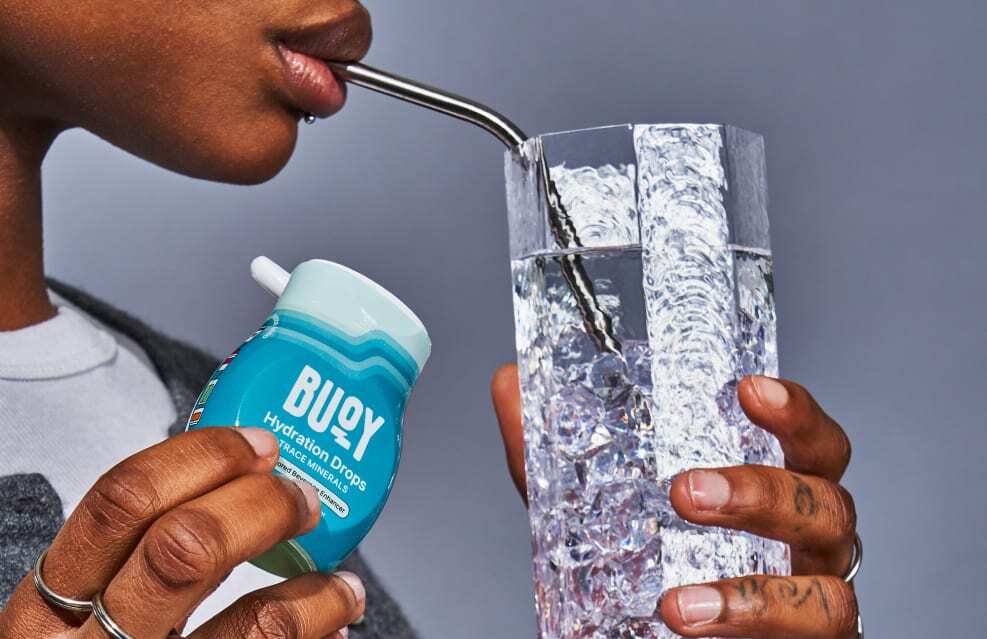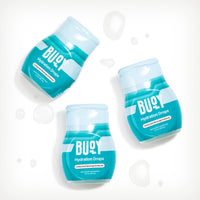Signs and Symptoms of Dehydration Explained
The human body is composed of around 60% water. All cells, organs and tissues need water to function properly. Even though we drink water and other fluids each day, we lose water through breathing, sweating, digestion and urination, which can lead to an imbalance of water in the body.
Essential Takeaways
- You lose electrolytes from pretty much just existing. If those electrolytes aren't replenished, unpleasant symptoms like headaches, muscle cramps, spasms and organ problems can occur.
- Water alone isn't enough! Thanks to Buoy, replacing your electrolytes has never been easier or more convenient!
Mild dehydration is easily corrected by replenishing fluids and electrolytes, but left unchecked, it can lead to life-threatening complications.
- Why Does the Body Need Water?
- Causes of Dehydration
- Dehydration Risk Factors
- Symptoms of Dehydration
- Dehydration Diagnosis
- Dehydration Treatment
- Preventing Dehydration
- Replacing Electrolytes
- Beat Dehydration With Buoy
Why Does the Body Need Water?
Every living thing on Earth needs water. While the amount depends on a number of factors, including the climate, physical activity levels and health conditions, humans can only live a few days without water.
Here are some of the ways our bodies use water:
Regulating Body Temperature
When our bodies become overheated, we sweat to shed excess heat. The evaporation of sweat is a loss of calories in the form of heat, which allows our bodies to release energy and maintain internal temperatures.
Protecting Internal Organs
Water is necessary to keep sensitive tissues moist, such as your eyes, nose and mouth. Adequate hydration helps your body retain the ideal moisture levels in these membranes, as well as in the vital organs, bones, bloodstream and brain. Water also acts as a cushion and lubricant for the joints and protects the spinal cord.
Aiding Digestion
When we eat food, we produce saliva with enzymes to begin to break it down into its mineral and nutrient components. Saliva is primarily water, so dehydration can impact the ability of the body to digest food properly. Water is also necessary to digest soluble fiber, which is an important factor in bowel health.
Removing Waste
Our bodies have several systems that remove waste, known collectively as the excretory system. The integumentary system, which includes the skin, eliminates waste through sweat, and the urinary tract eliminates waste through filtration in the kidneys, ureters and bladder in the form of urine. The digestive system eliminates waste through the gastrointestinal tract and the digestive organs, which include the tongue, salivary glands, pancreas, liver and gallbladder. Water is necessary for all of these organs to effectively remove waste.
Causes of Dehydration
During normal activity, all humans lose some water through sweating, urination, defecation and other bodily processes. When this water isn’t replaced, dehydration can occur.
Sweating
Sweating is a natural process for cooling the body and maintaining the optimal core temperature. As your body becomes hot, the sweat glands release moisture to cool off. Sweat is mostly water and electrolytes, particularly salt. If you’re sweating profusely, you could lose excessive water and electrolytes that need to be replaced.
Urination
Urination is a natural process that flushes waste from the body. Normal urine volume and frequency, combined with adequate water intake, aren’t a cause for concern. Some health conditions can lead to increased urine output, however, such as an overactive bladder, diabetes insipidus, anxiety disorders, bladder stones and kidney conditions. When these lost fluids aren’t replaced, dehydration occurs.
Vomiting and Diarrhea
While the occasional bout of diarrhea or vomiting isn’t cause for alarm, prolonged or excessive vomiting and diarrhea can lead to dehydration. The body loses a lot of water and electrolytes during this process, often too quickly to be replaced.
Fever
A fever is a body temperature higher than the normal range. The parameters for normal can vary, but most humans have a temperature around 98.6 F. A fever is an indicator of an infection or illness that your body is trying to fight off. Low-grade fevers, or fevers between 98.6 F and 100.4 F, aren’t usually cause for alarm, but high fevers can be potentially life-threatening. When you have a fever, your body produces sweat in an effort to cool itself. With high fevers, the amount of sweat you produce can quickly deplete your water stores, leading to dehydration. This is especially true in cases when a fever is accompanied by gastrointestinal symptoms like vomiting and diarrhea.

Dehydration Risk Factors
While anyone may become dehydrated, there's a higher risk for certain individuals. Many athletes are at risk for dehydration from sweating, including swimmers, cyclists, runners and bodybuilders. Some other people at an increased risk for dehydration include:
- The elderly
- Individuals with chronic health conditions
- Infants
- Young children
- Individuals in high altitudes
- Individuals who work outdoors in hot or humid environments, such as landscapers and construction workers
Symptoms of Dehydration
Dehydration can range from mild to severe. Mild dehydration symptoms include:
- Fatigue
- Dry mouth
- Thirst
- Decreased urination
- Low tear production
- Dry skin
- Dizziness
- Lightheadedness
- Headache
- Constipation
Severe dehydration is a medical emergency, especially with symptoms like disorientation, severe diarrhea, bloody stool and the inability to keep fluids down. Left untreated, dehydration can lead to life-threatening complications like heatstroke, heat exhaustion, heat cramps, hypovolemic shock, kidney failure, coma and seizures from electrolyte loss. Other symptoms of severe dehydration include:
- Excessive thirst
- Low sweat production
- Low blood pressure
- Rapid respiration
- Rapid heart rate
- Shriveled skin
- Sunken eyes
- Dark urine
Dehydration Diagnosis
If dehydration is suspected, your doctor will consider the symptoms and other possible health conditions and check your vital signs for a rapid heart rate and low blood pressure. You may also get a blood test for electrolytes that can indicate fluid loss and creatinine levels, which are indicators of kidney function. Doctors may also use urinalysis to test for urine concentration and electrolyte loss.
Dehydration Treatment
Treating dehydration depends on the severity and cause, but in most cases, mild dehydration can be treated by simply replenishing the fluids and electrolytes. With more severe cases, fluids and electrolytes may need to be administered through an IV. If you're able to drink, having water with a no-sugar electrolyte mix may be enough to rehydrate effectively.
Preventing Dehydration
For healthy individuals, thirst is a reliable indicator of the body's need to replenish fluids and electrolytes. Unfortunately, if you're experiencing thirst, your body is already mildly dehydrated.
In addition to drinking when you're thirsty, you can prevent dehydration by drinking plenty of fluids throughout the day. It doesn't have to be plain water— you can drink juice, tea, smoothies, milk and other beverages.
You can also get water from fresh fruits and vegetables, such as leafy greens, berries, melons, pineapples, grapes and tomatoes. Eating some with every meal will give you hydration and a boost of vital nutrients, such as essential vitamins and minerals.
If you're experiencing any of the risk factors for dehydration, it's important to take steps to stay hydrated.
In the case of illness with vomiting and diarrhea, it's best to hydrate as soon as the illness occurs. If you wait until the symptoms get more severe, it will be more difficult to effectively rehydrate and restore balance. You can also become dehydrated from illnesses like bronchitis, urinary tract infections and colds, so be sure to get plenty of fluids if you're sick.
Hydration is important in extreme temperatures as well. In hot and humid weather, your body will produce a lot of sweat to cool down. In cold weather, your body loses moisture from dry air, especially at high altitudes.
Athletes and people who engage in strenuous physical activity need to hydrate regularly and often to replenish the water lost from sweat. Ideally, you should ensure that you're well-hydrated the day before your workout, then be sure to drink water or other beverages during your workout. After your workout, it's important to drink more fluids and replace the electrolytes you lose through sweat, particularly sodium.
Replacing Electrolytes
When your body loses water, it's also losing electrolytes. Minerals like electrolytes carry an electric charge and exist in bodily fluids such as blood, urine and tissues. Sodium, potassium, calcium, chloride, magnesium and phosphate are common electrolytes that perform a variety of functions within the body, including:
- Maintaining ideal water balance
- Maintaining optimal acid/alkaline balance (pH balance)
- Transporting nutrients into cells
- Contracting and relaxing muscles
- Nerve signaling
Our bodies are unable to produce electrolytes, so we must get them from our diet. Many foods contain the electrolyte minerals we need, such as leafy greens, meat and fish, nuts and seeds, and table salt.
When your body loses an excessive amount of water, the electrolytes go with it. If those electrolytes aren't replenished, unpleasant symptoms like headaches, muscle cramps, spasms and organ problems can occur. Worse yet, drinking a lot of plain water without electrolytes following fluid loss only exacerbates the symptoms.
Beat Dehydration With Buoy
Even with regular fluid intake, it can be easy to become dehydrated in hot or humid weather, during a tough workout or when you're sick. Replacing your electrolytes has never been easier or more convenient thanks to Buoy.
The easy-squeezy Buoy electrolyte bottle is packed with essential electrolytes, including magnesium and potassium, so you can squeeze a dose of electrolytes into your drink on the go. It's designed so you can boost ANY drink with those all-to-necessary electrolytes without demolishing the taste. Start squeezing your Buoy today!

References:
- “The Urinary Tract & How It Works.” National Institute of Diabetes and Digestive and Kidney Diseases, U.S. Department of Health and Human Services, 1 Jan. 2014, www.niddk.nih.gov/health-information/urologic-diseases/urinary-tract-how-it-works
- “Excretory System.” ScienceDaily, ScienceDaily, www.sciencedaily.com/terms/excretory_system.htm
- Adams, William M, et al. “The Utility of Thirst as a Measure of Hydration Status Following Exercise-Induced Dehydration.” Nutrients, MDPI, 7 Nov. 2019, www.ncbi.nlm.nih.gov/pmc/articles/PMC6893511/
- https://www.webmd.com/a-to-z-guides/dehydration-adults#1
- https://www.mayoclinic.org/diseases-conditions/dehydration/symptoms-causes/syc-20354086
- https://familydoctor.org/dehydration/








